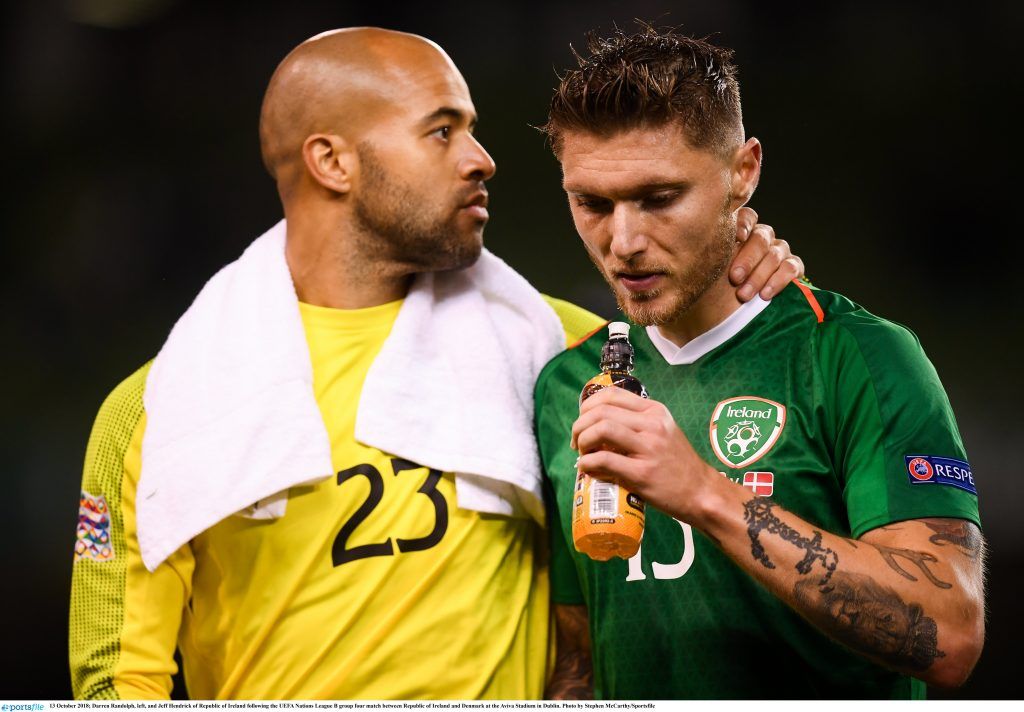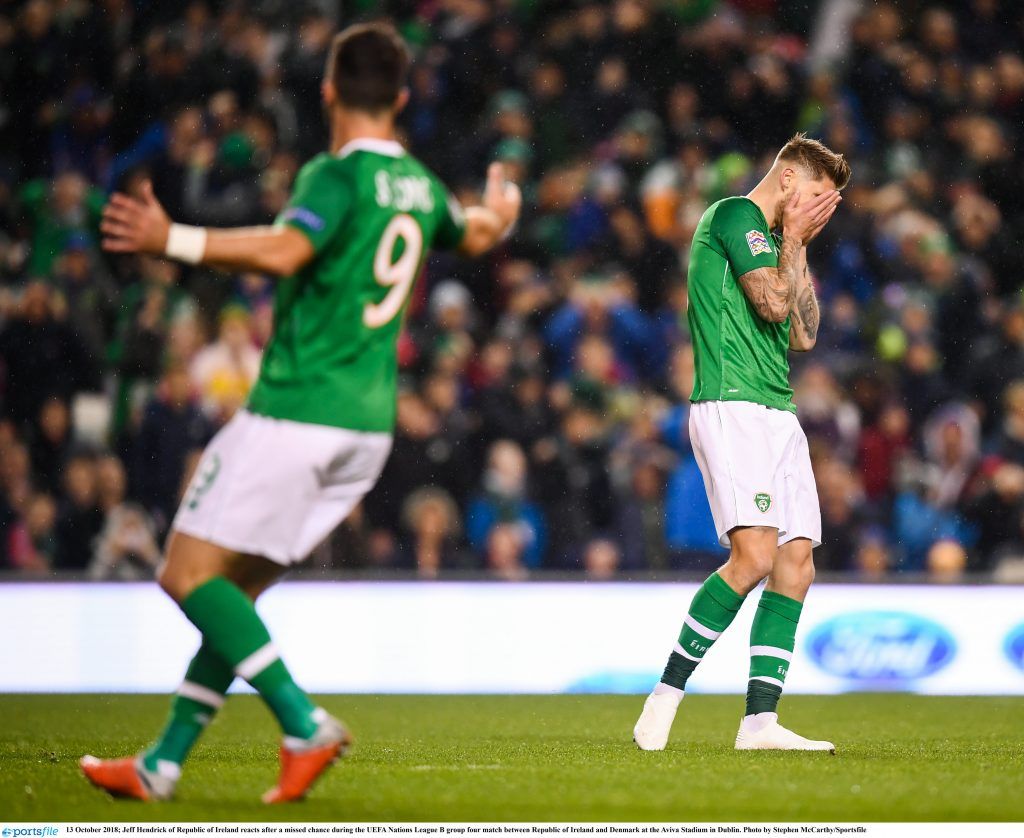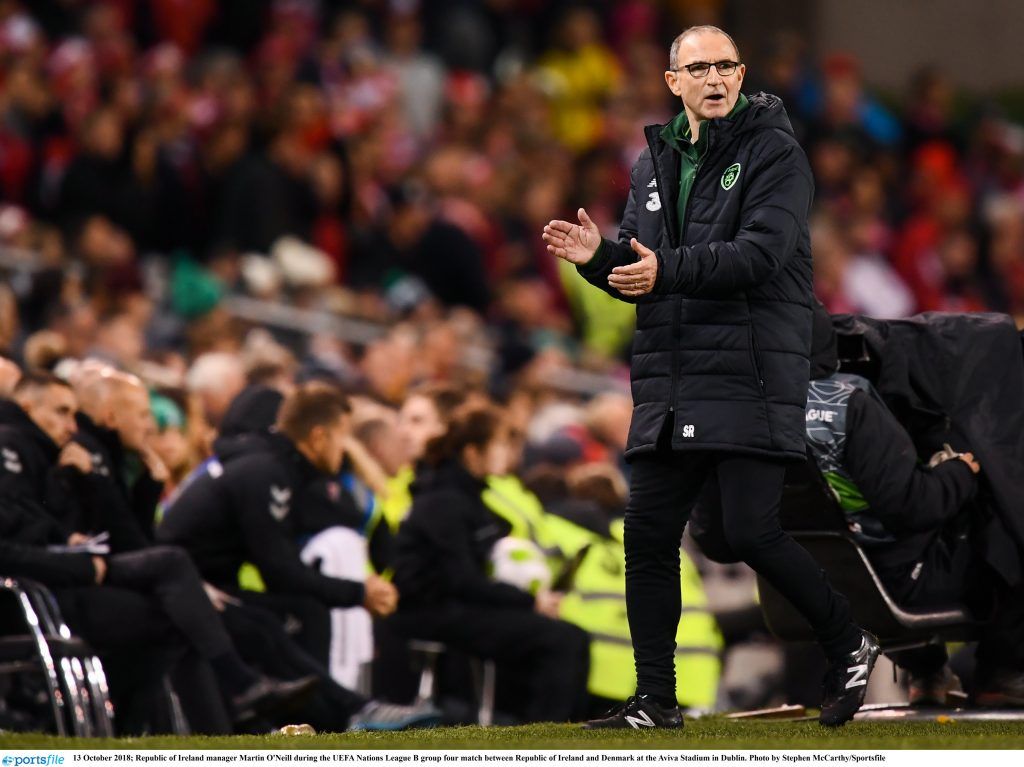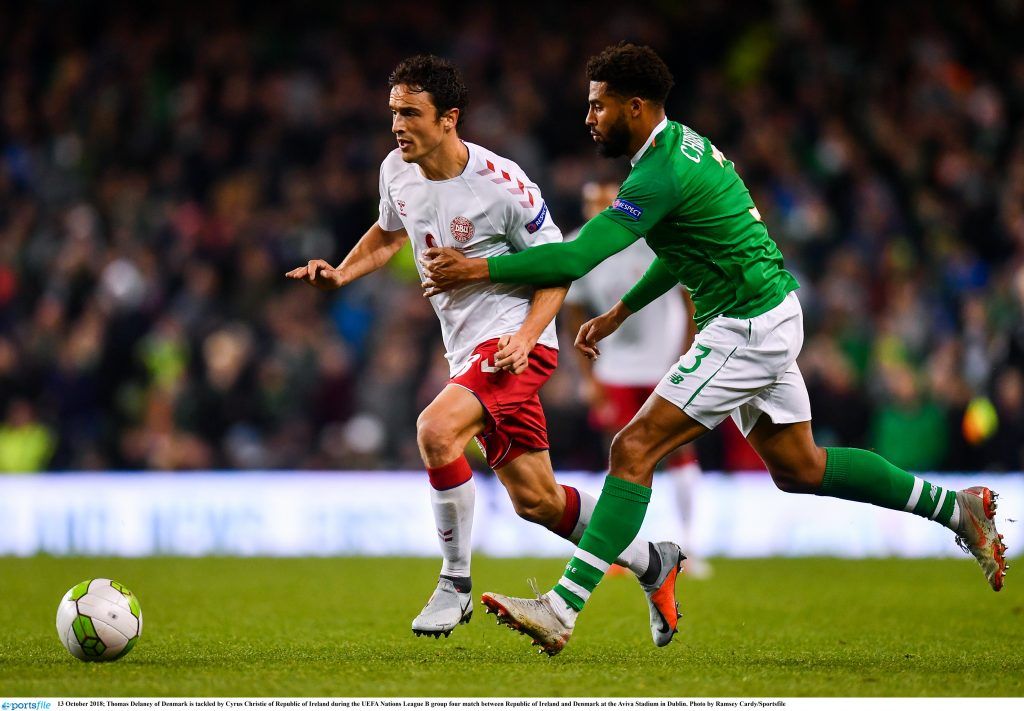

Share
13th October 2018
11:49pm BST

 The most interesting aspect of the match was trying to figure out what formation Ireland were playing. It was something resembling 3-5-1-1. There were wingers playing in midfield, midfielders playing up front and full-backs in central midfield.
The Irish team struggle enough as it is without starting players in positions that are foreign to them. It's unclear how they expected to score and there were no discernible patterns of play.
For 10 minutes after half-time, they couldn't get the ball from a limited Danish side, missing Christian Eriksen, their best player. The Irish team barely strung two passes together in this period.
The most interesting aspect of the match was trying to figure out what formation Ireland were playing. It was something resembling 3-5-1-1. There were wingers playing in midfield, midfielders playing up front and full-backs in central midfield.
The Irish team struggle enough as it is without starting players in positions that are foreign to them. It's unclear how they expected to score and there were no discernible patterns of play.
For 10 minutes after half-time, they couldn't get the ball from a limited Danish side, missing Christian Eriksen, their best player. The Irish team barely strung two passes together in this period.
 Johan Cruyff once said, "It isn’t the man on the ball who decides where the ball goes, but the players without the ball." This can be applied to Ireland, as there was painfully little movement from players when the team came into possession. There were so few options for a pass. The ball went long to Shane Long and was soon lost.
The best goalscoring chance of the match came when Denmark stopped playing and Jeff Hendrick went through on goal early in the first half. He somehow hit his shot wide.
Even when the opposition stop playing, Ireland can't score.
After the match, Martin O'Neill was upbeat. His team had kept a clean sheet, after shipping nine goals in their last two competitive games, and he lives to fight another day. He was probably the only one happy after the turgid display from both teams. There were almost 42,000 in attendance to witness this dross. Maybe Irish people really are the best football fans in the world.
Johan Cruyff once said, "It isn’t the man on the ball who decides where the ball goes, but the players without the ball." This can be applied to Ireland, as there was painfully little movement from players when the team came into possession. There were so few options for a pass. The ball went long to Shane Long and was soon lost.
The best goalscoring chance of the match came when Denmark stopped playing and Jeff Hendrick went through on goal early in the first half. He somehow hit his shot wide.
Even when the opposition stop playing, Ireland can't score.
After the match, Martin O'Neill was upbeat. His team had kept a clean sheet, after shipping nine goals in their last two competitive games, and he lives to fight another day. He was probably the only one happy after the turgid display from both teams. There were almost 42,000 in attendance to witness this dross. Maybe Irish people really are the best football fans in the world.
 The most significant outcome from this match is that O'Neill and Roy Keane will remain in their jobs.
Before the Denmark match, it felt like there was a possibility that change could come if the team suffered another hammering. They have stopped the rot and shored up the defence. It's unclear how they plan to help combat Ireland's problem in finding the net.
However, much like O’Neill with his Clough anecdotes, criticism of him has become boring at this stage. Like the Ireland manager, we’re just repeating ourselves.
Irish football desperately needs to modernise, and it could be argued that the management team have lost their effect after a positive first few years in the job. That's how it felt after the 5-1 defeat to Denmark last November and after the 4-1 loss to Wales last month.
But, those results didn't end O'Neill's tenure and either will this goalless draw.
https://twitter.com/SportsJOEdotie/status/1039156533748219904
For some reason, Ireland's full-back playing in midfield, Cyrus Christie, was awarded man of the match.
This may have been because he had the team's only serious effort on goal - a comfortable save for Kasper Schmeichel in the second-half. For most of the game, he looked lost, chasing shadows in midfield and incapable of getting close to the Danes.
It wasn't his fault. He's a full-back playing in midfield.
The most significant outcome from this match is that O'Neill and Roy Keane will remain in their jobs.
Before the Denmark match, it felt like there was a possibility that change could come if the team suffered another hammering. They have stopped the rot and shored up the defence. It's unclear how they plan to help combat Ireland's problem in finding the net.
However, much like O’Neill with his Clough anecdotes, criticism of him has become boring at this stage. Like the Ireland manager, we’re just repeating ourselves.
Irish football desperately needs to modernise, and it could be argued that the management team have lost their effect after a positive first few years in the job. That's how it felt after the 5-1 defeat to Denmark last November and after the 4-1 loss to Wales last month.
But, those results didn't end O'Neill's tenure and either will this goalless draw.
https://twitter.com/SportsJOEdotie/status/1039156533748219904
For some reason, Ireland's full-back playing in midfield, Cyrus Christie, was awarded man of the match.
This may have been because he had the team's only serious effort on goal - a comfortable save for Kasper Schmeichel in the second-half. For most of the game, he looked lost, chasing shadows in midfield and incapable of getting close to the Danes.
It wasn't his fault. He's a full-back playing in midfield.
 After the match, O'Neill spoke about how happy he was with the Fulham defender's performance.
He referenced how Christie is "athletic, strong, in really good condition." According to the Ireland manager, Christie "helped" his teammate, the "young" Matt Doherty - a player who is nine months older than Christie.
Ireland had midfielders on the bench. Instead, O'Neill opted for the team's third-best right-back to play in a position that is alien to him.
Ireland once had Roy Keane in midfield. Now they have an "athletic" full-back running around in the position and the manager is pleased. That's how far the national team has fallen. This is what mediocrity looks like. And it looks like we better get used to it.
After the match, O'Neill spoke about how happy he was with the Fulham defender's performance.
He referenced how Christie is "athletic, strong, in really good condition." According to the Ireland manager, Christie "helped" his teammate, the "young" Matt Doherty - a player who is nine months older than Christie.
Ireland had midfielders on the bench. Instead, O'Neill opted for the team's third-best right-back to play in a position that is alien to him.
Ireland once had Roy Keane in midfield. Now they have an "athletic" full-back running around in the position and the manager is pleased. That's how far the national team has fallen. This is what mediocrity looks like. And it looks like we better get used to it.Explore more on these topics: